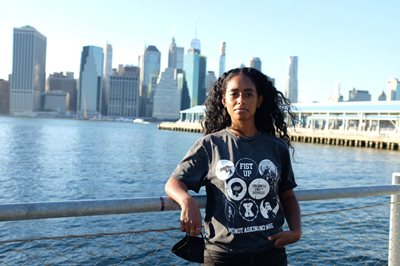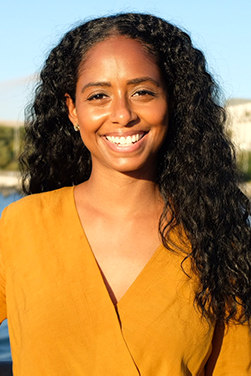My Late Arrival to Celebrating Juneteenth
The first time Juneteenth was elevated to my awareness with a critical eye was watching an episode of “Atlanta.” That episode is a LOT. (Watch it, and the whole series, if you haven’t already.) It brought me to a place of reflection, in particular on the complexities of this deeply powerful and pivotal day in Black history. And the lack of recognition by America’s institutions, and the lack of acknowledgement on a large scale by non-Black people in our country. Why is it not celebrated by all, and LOUDLY? And why wasn’t I already celebrating the day in a meaningful way?
Well. I don’t have any good answers as to why I arrived late to celebrating Juneteenth. Besides the obvious — if you allow our country to be your sole education you will be late to important historical details and context.
I was raised by young parents, 21 and 24, and I imagine having children at such formidable ages causes holes in information sharing. During my own years as a teenager and young adult I was focused on many other things — dating, career, moving cities, family dynamics, self-actualization — besides understanding my own history and people. Like many milestones in life, I was late. But when I do finally reconcile with the bigger picture, I dive in. The questions and realizations that started with that episode have led to a journey, a very personal quest, of learning and immersing myself in the accurate depths of American Black history and culture.
 Despite lauding America as “the land of the free,” even the author of our national anthem owned enslaved people (ownership and a person put together, it hurts to use those words but infuriatingly, Black people were property), as did former Presidents and many other historical leaders. And the lyrics “the hireling and slave,” we cannot be certain of their intention and meaning. Our country’s difficult history is not taught in an honest and forthright way. To this day, a child’s education and understanding of an enslaved person’s life depends largely on the individual teaching it. I am beyond frustration that America gives such value, appreciation and recognition in observing Christopher Columbus, the Fourth of July and Thanksgiving yet moves unapologetically slowly in officially observing Juneteenth.
Despite lauding America as “the land of the free,” even the author of our national anthem owned enslaved people (ownership and a person put together, it hurts to use those words but infuriatingly, Black people were property), as did former Presidents and many other historical leaders. And the lyrics “the hireling and slave,” we cannot be certain of their intention and meaning. Our country’s difficult history is not taught in an honest and forthright way. To this day, a child’s education and understanding of an enslaved person’s life depends largely on the individual teaching it. I am beyond frustration that America gives such value, appreciation and recognition in observing Christopher Columbus, the Fourth of July and Thanksgiving yet moves unapologetically slowly in officially observing Juneteenth.
Two years ago, I celebrated Juneteenth for the first time. (Which, admittedly, is difficult to share. Leaning into my vulnerability with power, I’ll continue.) That year, Juneteenth was on a Wednesday. My friends were celebrating early in the afternoon, so I took a half day off from work. It’s not the only day I have had to explain and/or defend why I need time off work. I was raised Muslim, so I’ve never had the privilege of my country recognizing my religious holidays. The idea of excusing myself from “regular life” to be with a close-knit community isn’t new to me, but it is something I associate with immense personal pride. Taking the time to connect with like-minded people, when we aren’t generally celebrated or acknowledged, has a way of bringing you closer to that community.
I remember having such childlike excitement in anticipation of my first celebration — deciding what outfit could possibly do this day justice, leaving my responsibilities behind (for only a short time, but a callout, an important distinction of the celebration, nonetheless) and knowing I was going to be welcomed by a warm and safe and happy group of friends. What I distinctly recall from that afternoon is laughing, light and freeing laughs, and deep belly laughs. I remember feeling acutely cognizant of how special it was to make our own little corner of the world to recognize the power of this day. Emancipation. Freedom
What sticks out most is when one of the hosts took a moment for us all to toast. We had been jubilant in our togetherness. Playing games, streaming movies in the background put on pause only for interludes of “put it on, put it on” songs and conversations of notable Black figures, both from our past and present, who guide us in all that we manage day-to-day. He said — pardon me as I paraphrase — Thanks everyone for taking off from work today to be here. You are all special people to me. And who you are every day are examples to the Black children who see you, in the city and on the subway. You, dressed up, heading to your fancy jobs. To those kids you represent all the options they can imagine for themselves and their futures. It helps them know, I can be that person one day too. I love you all.
I lean on that afternoon. Beautiful and pure. My friend’s words. Embedded with so much love and respect. Especially during trying times like this past summer, when I wasn’t sure if a day would pass by that I wouldn’t cry.
Those words and the feeling of reassurance tapped on something so fragile and specific that I didn’t know I needed. That by just being me, I bring encouragement and representation to young Black people. I sit with that feeling. I sit with it when I need inner strength. I sit with it when I need assuredness on who I am and the impact I’m striving to make. I sit with it and lean on it. And let it guide me through.
Well. I don’t have any good answers as to why I arrived late to celebrating Juneteenth. Besides the obvious — if you allow our country to be your sole education you will be late to important historical details and context.
I was raised by young parents, 21 and 24, and I imagine having children at such formidable ages causes holes in information sharing. During my own years as a teenager and young adult I was focused on many other things — dating, career, moving cities, family dynamics, self-actualization — besides understanding my own history and people. Like many milestones in life, I was late. But when I do finally reconcile with the bigger picture, I dive in. The questions and realizations that started with that episode have led to a journey, a very personal quest, of learning and immersing myself in the accurate depths of American Black history and culture.
 Despite lauding America as “the land of the free,” even the author of our national anthem owned enslaved people (ownership and a person put together, it hurts to use those words but infuriatingly, Black people were property), as did former Presidents and many other historical leaders. And the lyrics “the hireling and slave,” we cannot be certain of their intention and meaning. Our country’s difficult history is not taught in an honest and forthright way. To this day, a child’s education and understanding of an enslaved person’s life depends largely on the individual teaching it. I am beyond frustration that America gives such value, appreciation and recognition in observing Christopher Columbus, the Fourth of July and Thanksgiving yet moves unapologetically slowly in officially observing Juneteenth.
Despite lauding America as “the land of the free,” even the author of our national anthem owned enslaved people (ownership and a person put together, it hurts to use those words but infuriatingly, Black people were property), as did former Presidents and many other historical leaders. And the lyrics “the hireling and slave,” we cannot be certain of their intention and meaning. Our country’s difficult history is not taught in an honest and forthright way. To this day, a child’s education and understanding of an enslaved person’s life depends largely on the individual teaching it. I am beyond frustration that America gives such value, appreciation and recognition in observing Christopher Columbus, the Fourth of July and Thanksgiving yet moves unapologetically slowly in officially observing Juneteenth. Two years ago, I celebrated Juneteenth for the first time. (Which, admittedly, is difficult to share. Leaning into my vulnerability with power, I’ll continue.) That year, Juneteenth was on a Wednesday. My friends were celebrating early in the afternoon, so I took a half day off from work. It’s not the only day I have had to explain and/or defend why I need time off work. I was raised Muslim, so I’ve never had the privilege of my country recognizing my religious holidays. The idea of excusing myself from “regular life” to be with a close-knit community isn’t new to me, but it is something I associate with immense personal pride. Taking the time to connect with like-minded people, when we aren’t generally celebrated or acknowledged, has a way of bringing you closer to that community.
I remember having such childlike excitement in anticipation of my first celebration — deciding what outfit could possibly do this day justice, leaving my responsibilities behind (for only a short time, but a callout, an important distinction of the celebration, nonetheless) and knowing I was going to be welcomed by a warm and safe and happy group of friends. What I distinctly recall from that afternoon is laughing, light and freeing laughs, and deep belly laughs. I remember feeling acutely cognizant of how special it was to make our own little corner of the world to recognize the power of this day. Emancipation. Freedom
What sticks out most is when one of the hosts took a moment for us all to toast. We had been jubilant in our togetherness. Playing games, streaming movies in the background put on pause only for interludes of “put it on, put it on” songs and conversations of notable Black figures, both from our past and present, who guide us in all that we manage day-to-day. He said — pardon me as I paraphrase — Thanks everyone for taking off from work today to be here. You are all special people to me. And who you are every day are examples to the Black children who see you, in the city and on the subway. You, dressed up, heading to your fancy jobs. To those kids you represent all the options they can imagine for themselves and their futures. It helps them know, I can be that person one day too. I love you all.
I lean on that afternoon. Beautiful and pure. My friend’s words. Embedded with so much love and respect. Especially during trying times like this past summer, when I wasn’t sure if a day would pass by that I wouldn’t cry.
Those words and the feeling of reassurance tapped on something so fragile and specific that I didn’t know I needed. That by just being me, I bring encouragement and representation to young Black people. I sit with that feeling. I sit with it when I need inner strength. I sit with it when I need assuredness on who I am and the impact I’m striving to make. I sit with it and lean on it. And let it guide me through.
Published February 27, 2021
Photo Credit: Dorothy Ho, Virginia Gamma


